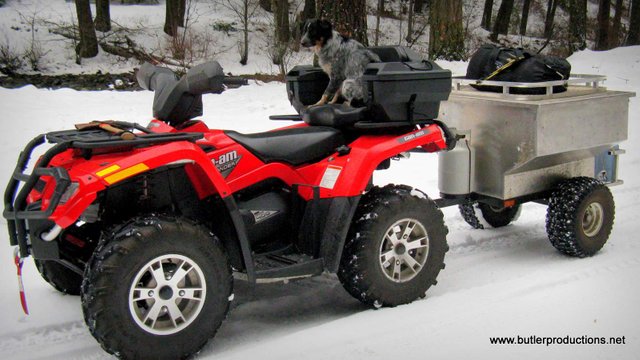Cold Weather Survival
Of all the seasons, Winter is without a doubt the most difficult to survive in. In most cases, the snow and ice will hide most of your resources as well as make every part of survival extremely difficult. Even in the mildest of conditions, survival in the winter is miserable at best but one of the most important types of survival to learn and prepare for if you are a hunter or if you spend any time in the wilderness. The single most dangerous factor of winter survival is Hypothermia. "Hypo" means under, (hence a hypodermic syringe delivers liquid under the dermis - the skin). Normal human core body temperature is 37°C (98.6°F), clinically hypothermia occurs when the core temperature falls below 35°C (95°F) - that's not much of a drop in temperature.
If someone is exposed to cold and inadequately protected, their body will first try to generate more heat through shivering to maintain a normal temperature. If the body can't stay warm by these means, it will start trying to decrease heat loss by decreasing blood flow to the extremities to minimize cooling. Finally, if the loss of heat carries on despite these measures, the body will slow its metabolism to minimize its need for fresh blood flow and oxygen supply.
If it is inevitable, then the sooner the body reaches the final step, the better chance of survival so that the organs won't become starved of oxygen. For example, a core temperature of 20°C (68°F) requires only 20% of the oxygen required at normal body temperature of 37°C (98.6°F).
Given these facts, your number one priority in a winter survival situation should be fire, followed by shelter. With those two items, you stand the best chance of surviving long enough to be rescued. A person can live weeks without food and in most cases you will have some form of water near by, so the majority of your time should be spent on firewood and shelter. Only then should you spend time on the other needs.
Survival in cold weather is drastically different from warm weather. Your priorities, as well as your equipment will be different from what you are used to when dealing with warm weather conditions. If you have followed the preparation steps, you are properly dressed, and you have a well thought-out survival kit, you should be able to survive at least a week and maybe longer.
Below are a few tips to assist in a cold weather survival situation:
- Do not make your shelter too big - Your shelter should be only big enough to fit your body inside, the idea being that your body will help to heat the shelter. You don't want to waste precious body heat on void space.
- Construct a platform up off of the ground - Whether you build a small platform from poles or simply just throw pine bough's or debris on the bottom of your shelter, you must keep your body from making direct contact with the ground. This will eliminate the ground from draining your body heat and it allows moisture to drain away from your body.
- Stock enough firewood to make it through the night - When you think that you have enough, get 5 times more. By getting all of your firewood during the day, you conserve the batteries in your flashlight and besides, it is much easier to find quality firewood in the daylight. It also reduces the risk of injury.
- Conserve firewood by keeping the fire as small as possible - If you have to spend a few days, you are going to need a large quantity of firewood. The more firewood you use means the further that you have to carry it as you burn up everything that is in the local area.
- Always try to build your shelter against a heat reflecting object - With a good shelter and a reflecting wall, you can stay pretty warm with a small fire. It is best to build next to a rocks or trees to help reflect heat to your body. They also will retain some residual heat.
- Utilize natural formations where possible to conserve your resources and energy - If you can utilize a naturally enclosed or partially enclosed formation, it will save you much needed calories to be spent on other tasks.
- Note your surroundings - During the daylight hours, it is to your advantage to memorize landmarks and features in your camping area. This is helpful and will reduce the risk of injury in the event that you need firewood or water after dark.
- Use your hat to regulate your body temperature - Your head is like a radiator. You lose a majority of your body heat through it. Your hat should be the first thing that you remove if you begin to sweat.
- Stay dry and dry out when possible - The best way to stay warm is to stay dry. If you get wet, take the time to dry your clothes, boots, and gloves thoroughly.
- Recycle rocks to heat your body - A great way to warm yourself up and to help you stay warm while you sleep is to collect medium sized rocks and keep them in a pile by the fire. Warm them up and put them inside your pockets and clothes. Be careful not to get them too hot and recycle them in the pile frequently.
- Burn Calories wisely - If you have food to eat, eat it at night and before you sleep. The digestion process will help to heat your body. Plan your tasks to conserve your energy.

That ATV looks like an awesome winter trekker, and your dog looks ready to go! Great winter survival tips, thanks for the post :D